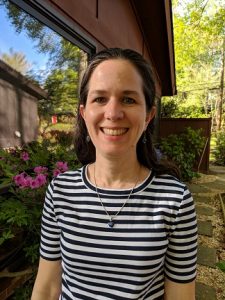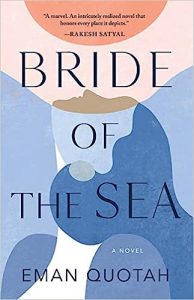Inspired by my illiterate grandmother: Writing toward a bilingual, bicultural literature and identity
Inspired by my illiterate grandmother: Writing toward a bilingual, bicultural literature and identity
By Eman Quotah
This is a condensed translation of an essay I originally wrote in Arabic.
 In all the books I read and films I saw growing up, I never encountered a character like my grandmother.
In all the books I read and films I saw growing up, I never encountered a character like my grandmother.
My grandmother, Jameela, was born in the first half of the twentieth century in Makkah. She married very young, like many girls of her generation, and she couldn’t read or write. She had twelve children. Her husband, my grandfather, died when their youngest was around 10. My grandmother migrated to Jidda from Makkah in the 1970s, and when she died, in 2005, she had more than 50 grandchildren.
She loved traveling and watching professional wrestling on TV. She made the best ma’moul, green beans, meat pie, stuffed grape leaves, Bukhari rice, Ramadan soup, dubyazah and qata’if. She loved to put on a silk dress and dance the Arab two-step at weddings and to ululate. One time, in Vienna, Austria, she saw a woman on the sidewalk in a miniskirt and from the car she yelled, in Arabic, “Cover up, girl!”
(If you speak Arabic, try to translate that last paragraph in your mind and see my grandmother in Arabic.)
When I wrote my novel, Bride of the Sea, I wanted one of the characters to be a woman like my grandmother. A Saudi, Arab, Muslim woman. A woman who is illiterate and uneducated because there were no schools for girls when she was little. But she’s smart and knowledgeable and she passionately loves her family.
Like my grandmother, my character Haleemah can’t read, so she has to ask someone to keep up her address book and read phone numbers to her when she makes a call. And like my grandmother, Haleemah can’t drive because 1980s Saudi Arabia forbids women from driving, so she asks her son to take her where she wants to go. But Haleemah is not merely a victim of her society. She has agency, even if it is severely restricted. She is her own guardian, even if that phrase has little practical meaning for her as a woman in her culture at the time the book is set.
In my novel, Haleemah and her granddaughter Hanadi are separated for more than 15 years. When they are reunited, they don’t share a language. But they don’t need words to communicate. They have love and the love language of food, the food Haleemah feeds her granddaughter.
For most of my life, the stories about Arab and Muslim women that have predominated in English-language publications and, especially, movies have loved to portray us as victims. Arab and Muslim men, more often than not, have been portrayed as villains. We need alternative narratives, rooted in our experience, our memories, our heart stories.
That’s why I wanted the characters in my novel to be like many of the people I knew growing up in Jidda. Everyday people. Normal people. People Arab readers will recognize, even though I created them in English, not Arabic.
For example, an Instagram reader said of my book, “I love how it portrays sheesha and faith.” These are aspects of our culture visible in Arabic art, film, and literature, but those of us who live in the “West” don’t see ourselves and our culture represented.
One of my projects in writing my novel was to create a language with which I could express a bilingual identity. When I wrote the thoughts and dialogue of the characters who spoke Arabic (like Haleemah), I wrote first in my head, in Arabic, then translated those words into English and wrote them on the page.
The Iraqi-American poet and novelist Dunya Mikhail, who writes in Arabic and English and translates her own work from one language to the other, says of her process, “I am ‘faithful’ to the original text when I translate other writers. But when the text is mine, I feel free to make changes.”
In writing Bride of the Sea, I had to identify and define my personal literary and cultural legacy and identity. I looked to beloved authors like Toni Morrison, Michael Ondaatje, Jhumpa Lahiri, and Teju Cole; to Arab literary legends like al-Khansaa’ and al-Mutanabbi; to the story of Prophet Yusef in the Qur’an and poets’ interpretation of his story and the love story of Yusef and Zulaykha; to Arab American fiction writers like Diana Abu-Jaber, Zaina Arafat, Randa Jarrar, Zeyn Joukhadar, and Rabih Alameddine; and to bilingual women poets like Marwa Helal, Zeina Hashem Beck, Threa Almontaser, and Safia Elhillo, who include Arabic, written in Arabic script rather than transliterated, in their English language poetry.
Cross-cultural literature is not only characterized by its ideas and themes. It is also characterized by its language, its relationship to history, its portrayal of people and peoples, its artistic techniques, its connection to wide-ranging cultures, its rejection of borders. We Arabs who write in English are sculpting a new literature in dialogue with both Western literature and Arab literature, one that expresses a unique and mixed identity and experience. In her poem “Ode to One Thousand,” my friend Majda Gama writes:
*Alf and not **alef, a letter parts them
like the door between self & mosque.
One a beginning, the other a penultimate night …
My grandmother did not live long enough to see the deep societal changes and new liberties in Saudi Arabia, starting with women gaining the right to drive five years ago. She didn’t see the publication of my debut novel, either. I wish she’d lived to hear the audiobook, even though she wouldn’t have understood it. Maybe, I could have translated it for her.
—
Eman Quotah’s debut novel, Bride of the Sea, won the 2022 Arab American Book Award for fiction. Her essays and short fiction have appeared in a bunch of publications.
BRIDE OF THE SEA
 NAMED MOST ANTICIPATED BOOK by Bustle * Goodreads * Ms. Magazine * Popsugar * Electric Literature * Chicago Review of Books * Newsweek * Alma * and more
NAMED MOST ANTICIPATED BOOK by Bustle * Goodreads * Ms. Magazine * Popsugar * Electric Literature * Chicago Review of Books * Newsweek * Alma * and more
“A marvel. An intricately realized novel that honors every place it depicts.” —Rakesh Satyal
“I love the sea,” she said. “I don’t know if I could live without it.”
During a snowy Cleveland February, newlywed university students Muneer and Saeedah are expecting their first child, and he is harboring a secret: the word divorce is whispering in his ear. Soon, their marriage will end, and Muneer will return to Saudi Arabia, while Saeedah remains in Cleveland with their daughter, Hanadi. Consumed by a growing fear of losing her daughter, Saeedah disappears with the little girl, leaving Muneer to desperately search for his daughter for years. The repercussions of the abduction ripple outward, not only changing the lives of Hanadi and her parents, but also their interwoven family and friends—those who must choose sides and hide their own deeply guarded secrets.
And when Hanadi comes of age, she finds herself at the center of this conflict, torn between the world she grew up in and a family across the ocean. How can she exist between parents, between countries?
Eman Quotah’s Bride of the Sea is a spellbinding debut of colliding cultures, immigration, religion, and family; an intimate portrait of loss and healing; and, ultimately, a testament to the ways we find ourselves inside love, distance, and heartbreak.
BUY HERE
Category: On Writing

























